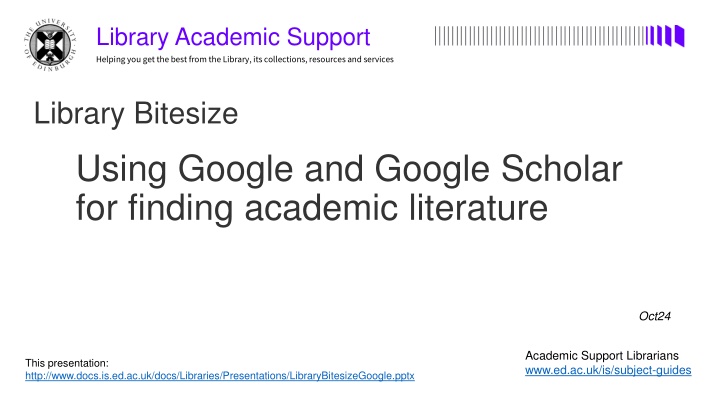
Advanced Tips for Effective Academic Literature Search Using Google Scholar
Enhance your academic literature search skills with advanced tips on utilizing Google Scholar effectively. Learn how to perform specific and advanced searches, set up quick access to online full-text materials, and discover relevant databases for your research. Find out why Google Scholar is a powerful tool with caveats to consider, differentiating it from general web searches. Explore search strategies, phrase searching, Boolean operators, and other tips to refine your search results and access the most relevant information for your academic needs.
Download Presentation

Please find below an Image/Link to download the presentation.
The content on the website is provided AS IS for your information and personal use only. It may not be sold, licensed, or shared on other websites without obtaining consent from the author. If you encounter any issues during the download, it is possible that the publisher has removed the file from their server.
You are allowed to download the files provided on this website for personal or commercial use, subject to the condition that they are used lawfully. All files are the property of their respective owners.
The content on the website is provided AS IS for your information and personal use only. It may not be sold, licensed, or shared on other websites without obtaining consent from the author.
E N D
Presentation Transcript
Library Academic Support Helping you get the best from the Library, its collections, resources and services Library Bitesize Using Google and Google Scholar for finding academic literature Oct24 Academic Support Librarians www.ed.ac.uk/is/subject-guides This presentation: http://www.docs.is.ed.ac.uk/docs/Libraries/Presentations/LibraryBitesizeGoogle.pptx
Library Academic Support Team Learning outcomes and objectives By the end of this session, you should be able to: Identify ways of performing more specific and advanced searches using Google/Google Scholar Know how to set up Google Scholar to quickly access online full text material available at the Library Know where to look for other relevant databases for your research
Library Academic Support Team Why use Google? Caveats Easy to use. Very large. Powerful search algorithms Easily accessible Content searched and prioritising unknown. but not searching entire internet. Searches are difficult to replicate and export. Your previous searches influence results. Difficult to see what is accessible legally (and what is not). Google is not a one stop shop DiscoverEd how you know what you can read via Library (print or online) Abstracting & Indexing databases - use for literature reviews, systematic reviews, researching a topic, etc.
Library Academic Support Team Google comes in different flavours General web search: www.google.co.uk Books Datasets https://datasetsearch.research.google.com/ https://books.google.co.uk/ - good for previews sometimes - but see Find and reuse data Images Videos News - but see Library subject guides https://images.google.co.uk/ www.google.com/videohp https://news.google.com/ https://scholar.google.co.uk Highlighting Google Scholar
Library Academic Support Team General searching tips Search tools/engines/platforms Offer similar features & functions. Use Helps and Advanced menus to check. Give some thought to search strategy. What do you want to read?...is appropriate to use?...are the best sources? Get words and phrases which describe the concepts you need to read about. Have some alternatives e.g. synonyms, variant terminology & spellings, abbreviations, etc. Start specific and broaden out as necessary.
Library Academic Support Team Google Search tips Phrase searching - Second World War Stemming in operation - diet finds dietary, diets, etc. Combining search terms - Boolean operators: AND, OR and NOT (-) Look at the refine options date, licencing (images), review articles, patents Where possible use Advanced Search. Search in a specific site. - site: in front of site or domain, e.g. site:who.int refugees site:un.org calories Cited by and Related articles links - helps broaden your search.
Library Academic Support Team Combining search terms/keywords Boolean operators AND all keywords must be included in search results. B A Google assumes AND OR at least one keyword must be included in search results. Used for synonyms, e.g. teenager OR adolescent OR In Google - type OR in upper case. A B NOT excludes from results those with the given keyword(s) In Google put - in front of the word to exclude A B e.g. jaguar speed -car Google s Advanced Search options can be useful to use instead.
Library Academic Support Team Advanced Search www.google.co.uk
Library Academic Support Team Google - Searching for grey literature
Library Academic Support Team See what has cited article since publication or see related articles Duplicates Examples of how to reference article and options for downloading to EndNote Export multiple citations to EndNote, etc by clicking the star icon and then going to My Library. You need to be signed in with a Google account.
Library Academic Support Team Google Scholar - Advanced Search https://scholar.google.com
Library Academic Support Team Google Scholar - Advanced Search Includes work cited in the work of others but which Google Scholar has not found online.
Library Academic Support Team Google Scholar full text via the University Library
Library Academic Support Team LibKey Nomad Have the quick link button appear when you are on sites recognised to be available to University of Edinburgh staff and students. Can sometimes help overcome temporary authentication issues Download the LibKey Nomad Browser Extension 14
Library Academic Support Team Google News Archive To locate an article from a news(paper) website use Advanced Search domain option For archive material, try: https://news.google.com /newspapers
Library Academic Support Team Newspaper sources Library subject guide: Newspapers, magazines and other news sources: https://edinburgh-uk.libguides.com/newspapers-magazines LibSmart II course on Learn with modules which include: Digital news sources. Digital primary sources and digital scholarship www.ed.ac.uk/is/libsmart
Library Academic Support Team More Google help How search works https://www.google.com/search/howsearchworks/how-search-works Help topics https://support.google.com/websearch Refine web searches https://support.google.com/websearch/answer/2466433 Google Scholar Help http://scholar.google.com/intl/en/scholar/help.html
Library Academic Support Team Finding academic literature - sources and help DiscoverEd - http://discovered.ed.ac.uk Library databases - www.ed.ac.uk/is/databases-subjects Library Subject Guides - www.ed.ac.uk/is/subject-guides egLiterature Searching Resources
Library Academic Support Team Help Your Academic Support Librarian: www.ed.ac.uk/is/ASL Library subject guides: www.ed.ac.uk/is/subject-guides Literature search clinics www.events.ed.ac.uk 19
